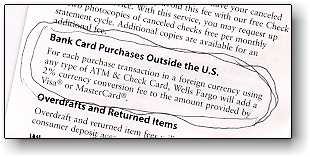|
Europe
> Money > ATM conversion fees
ATM 'Conversion Fees'

ABOVE: Wells Fargo slipped this bombshell into
a statement insert a few years ago, when the trend toward "conversion fees"
began.
By
Durant Imboden
Most experienced travelers will tell
you that ATMs are the cheapest way to get cash overseas. For that matter, so
does Visa, which handles currency conversion for banks around the world. Here's a statement from the Visa Global ATM Network Web page:
"Withdrawing cash at Visa/PLUS ATMs using a secured PIN
can save you money and makes it easy to take advantage of the favorable
exchange rates offered by ATMs. Cash withdrawals are dispensed in local
currency, and are debited from your account in your own currency - this
eliminates additional currency conversion fees and commissions often assessed
by traditional currency exchange bureaus."
Well, think again. Most banks tack an additional "conversion
fee" onto the Visa or MasterCard currency-exchange commission. Not only
that, but this hidden surcharge is on top of the flat "ATM-use" or transaction fees
that banks often charge for ATM withdrawals away from home.
Example: Wells Fargo, one of the largest banks in the U.S., charges a
conversion
fee "for each purchase transaction in a foreign currency using any type of
ATM & Check Card." The charge, which was recently raised from 2% to 3%, is in addition to the standard
1% currency-exchange commission levied by the Visa/MasterCard international
clearinghouse.
Let's do the math: For a withdrawal of US $100 in a
foreign currency, a Wells Fargo customer is paying a $1 currency-exchange
commission to the international clearinghouse, an additional $3 Wells Fargo conversion fee or
surcharge, plus a
flat $5 ATM transaction fee. Total cost: $9, which is equal to an eye-popping
8% exchange commission.
Such fees aren't limited to banks in the U.S. Many British banks now have
"currency conversion fees," and the epidemic has spread to other countries. In
June, 2007, an Australian reader reported:
"My
daughter is visiting Europe using a cashpassport card and ATMs displaying
the Visa sign. The cost of euros in Australian dollars was as expected in
the UK, higher in Paris and Germany, but from Prague she reported 300 Euros
cost up to AUD523. This must be about 9% on top of the flat transaction fee
of $3.75."
How can you avoid being gouged by high ATM surcharges?
- One way is to switch banks. You'll nearly always pay the 1% wholesale
exchange commission (which is only reasonable), but you can avoid bank
surcharges if you shop around or--in some cases--if you're a big-balance
customer at a bank that normally charges conversion fees.
- You can avoid the flat ATM-use fees (such as Wells Fargo's $5
overseas transaction fee) by getting your card from a Global ATM Alliance
bank and using member banks' ATMs abroad. The alliance has nine member banks
in eight countries, including Bank of America in the U.S., Barclays in the
UK, and Deutsche Bank in Germany. Also, the Wall Street Journal
reports that HSBC and Citibank have 18,000 ATMs each in more than 40
countries, and U.S. customers of those banks don't pay an ATM-use fee at
foreign locations.
- You can also minimize ATM fees by charging most purchases with a Visa or MasterCard. But watch out--some banks and other card issuers have
credit-card surcharges of up to 5%.
- Finally, be aware that some local banks or private ATM owners may tack
on their own fees. You'll
minimize the risk of such charges by using ATMs at major banks and post
offices.
Bottom line:
As banks lose income from traveler's checks, they're
looking for new ways to extract money from overseas travelers. Check your bank's
policy on conversion and transaction fees before you use an ATM card abroad--and
if you feel that your bank's fees are unreasonable, look for a less greedy bank.
| Another conversion scam: Merchant fees
Kelly K. Spors of The Wall Street Journal reports that some
hotels, stores, and other merchants are now charging foreign customers
in their home currencies. For example, an American visiting London might
receive a hotel bill in U.S. dollars instead of pounds sterling.
This "convenience" comes at a price, since the merchant is typically
padding the bill with a 2% to 5% commission on the currency exchange.
To avoid such fees, tell the merchant that you want to be billed in
local currency, and refuse to sign a charge slip in your own currency.
(According to the Journal, Visa requires merchants to let
customers opt out of conversion, and American Express waives its 2%
conversion fee if the merchant has performed the conversion.) |
About the author:
 Durant Imboden
is a professional travel writer, book author, and editor who focuses on European
cities and transportation. Durant Imboden
is a professional travel writer, book author, and editor who focuses on European
cities and transportation.
After 4-1/2 years of covering European travel topics for About.com, Durant and
Cheryl Imboden co-founded Europe for Visitors in
2001. The
site has earned "Best of the Web" honors from Forbes and The
Washington Post.
For more information, see
About
Europe for Visitors,
press clippings, and
reader
testimonials.
| |
|